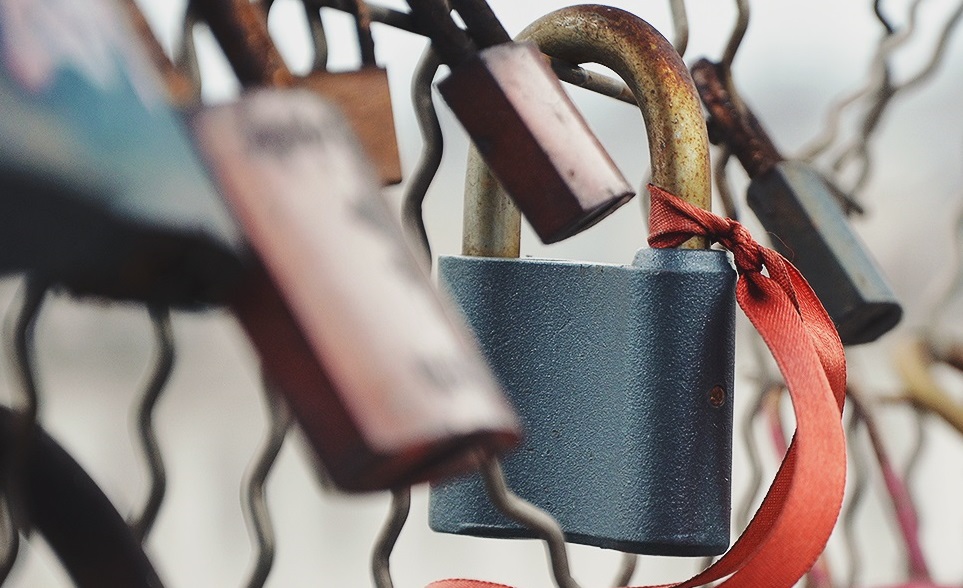The National Archives plays a key role in preserving the heritage of the UK. We hold documents going back almost a thousand years to the Domesday Book, and from there our record runs through British history, right up to Cabinet records from the Thatcher Government.
However only some of the information produced and held by government is sent to us for preservation. This means that departments have to manage most of the information they hold throughout its lifecycle, from gathering to use, storage, protection and eventually deletion.
What we do to help

Padlocks on a fence (photo by Sylwia Bartyzel)
As part of our Archives Inspire strategy, The National Archives is committed to providing expert advice and scrutiny to government. We play a vital role every day in ensuring that government keeps both the data of our citizens and vital corporate information safe, while also using it in the most effective way.
We are considered a world leader in working with large amounts of information, and are in a position to offer our expertise to other organisations across government. We have teams who provide advice on how to protect and handle personal and corporate data to all of the central government departments. We also conduct Information Management Assessments of departments and provide training to help civil servants develop their skills.
We work alongside a range of other public sector organisations including the National Cyber Security Centre (NCSC), Centre for Protection of National Infrastructure (CPNI) and the Information Commissioners Office (ICO). Together we provide advice on best practice and emphasise the importance of using information securely and in the public interest.
Why all staff members matter
One of the most important messages that we emphasise is that all civil servants should see the protection of information as being an integral part of their roles. A large number of data breaches can be prevented if front line staff understand the value of the data they work with, and identify potential risk areas. Staff within government should work with their supervisors and Knowledge and Information Management (KIM) experts to manage the risks.
If staff are able to protect and handle data correctly it can also maximise the efficiency of an organisation. We strive to ensure that we use and access the information we hold in the most efficient way possible. We find and retrieve over 600,000 documents per year in response to requests from members of the public in our reading rooms. If staff were unable to maintain integrity or security of the information we hold, we would not be able to undertake this vital work. It is only by ensuring that every colleague understands the importance of correctly managing the documents that we are able to provide services to the public.
Why we care about information security
Helping your organisation develop a culture that protects and manages data effectively is not an overnight process. It’s like the development of a culture of Health and Safety in organisations in recent decades. Today all staff undertake practices to keep themselves and their colleagues safe as a core part of their day to day jobs. Over time similar developments are being made across both the public and private sectors in the fields of security and information management.
This development across government is deeply important to the work of The National Archives, as the better departments are at handling and securing all of their information, the easier it will be to identify and transfer the correct documents to our repositories here at Kew. Great progress has been made in developing a secure culture in recent years and we will continue to help drive and support this development.
Firstly TNA does not maintain the heritage of the “UK” as it does not extend to Scotland nor Ireland but of the “UK Government”. Civil servants have had almost 200 years to protect their archives and has developed slowly since 1838 and I would suggest the issue of “deletion” in an information world is a big issue. However the number of release of files at TNA has shown a big hole in their judgements on release/non-release of documents where information, in my view, was wrongly released.
A strange statements about information security. The data transmitted uses http and not https; the former being easier to hack.
This site showed on Privacy Badger as being subject to attempted tracking by 4 Google based companies (bad reputations), which I have previously blocked.
Hardly a good advert for security?
Thanks for your comment. We have accredited information security measures in place at The National Archives, to protect our website and the information hosted here. Much of our website information is made freely available, but secure areas of our website are protected by HTTPS. Blog comments are not currently HTTPS, but we’ll look into whether that needs to change.
Best,
Nell